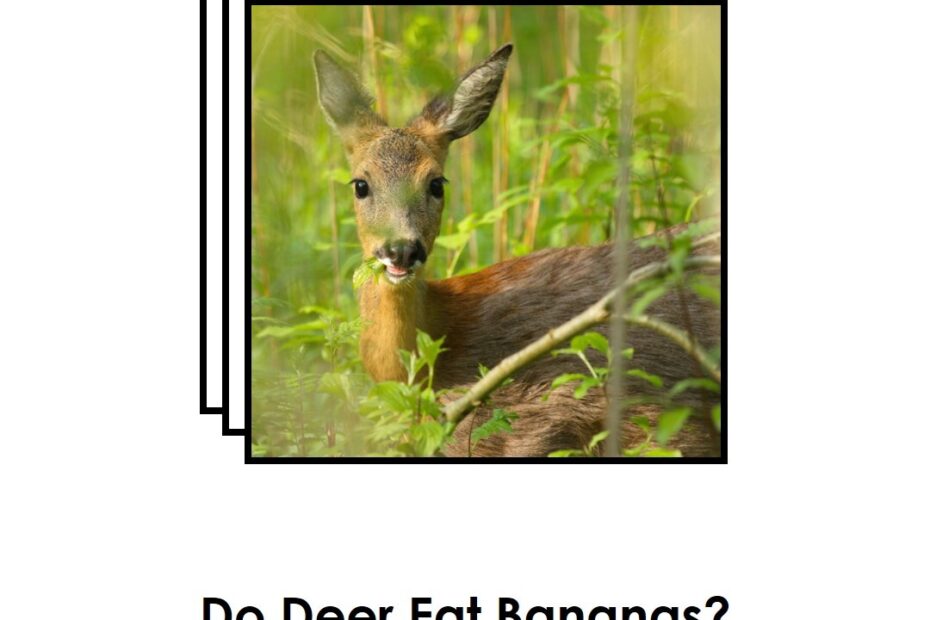Do Deer Eat Bananas?
You know that Deer don’t have a problem with bananas, but what makes them so fond of bananas?
How to feed Deer this sweet treat?
Banana is a fact of the matter. It is also one of their favorite meals.
Why do Deer like Bananas? (Scientific Explanation)
Bananas are a favorite food of deer because they have a strong sweet tooth. Deer also lack the upper incisors which are teeth animals use to chew hard food. Deer also love the softness of bananas.
Deer can be found almost anywhere on the planet, with Antarctica or Australia being the exceptions. Deer will likely eat banana trees and plants if they come across them.
The most common habitat for banana plants is in tropical regions like Central and South America and Africa, China and India. This is because many of the 40+ deer species found today live in areas with banana plants.
Deer in captivity are often fed hay. Deer like bananas and may be given the fruit as a treat once in a while.
Can Wild Deer be fed bananas or other foods?
Animal experts don’t recommend feeding wild deer for a variety of reasons.
Deer will eventually become afraid of humans because they have developed this dependency. This is not good because it is humans who make deer safe in the wild.
A second reason to not feed the animal is the possibility that feeding sites (that’s, places where deer are allowed to eat the food left out) could attract them in large numbers. These sites could lead to various diseases spreading around animals.
It also attracts predators (like coyotes, mountain lions, and wolves) to these areas, which puts deer in danger.
If deer in your region are dependent on humans already, it is time to start giving them the same food as wild animals.
If the forest floor is covered in snow, you can leave some nuts and leaves out for deer. Giving them a banana every now and again will not cause problems.
Can Deer Eat Banana Peels?
Deer will eat a whole banana, including the peel. The peel is not a forbidden food for deer. Although a banana peel is not toxic, it can cause digestive problems.
You should also consider the fact that peels occupy a lot of space in the stomach and provide almost no nutrients.
The peel will cause the deer to feel full and discourage them from looking for other nutritious foods. The deer could become malnourished if there are not enough nutrients.
Can I Feed Dried Bananas To Deer?
Bananas that have been dried aren’t good for deer because of their high sugar content.
Deer’s digestive systems are unable to process large amounts of sugar. Deer might experience stomach pains or other digestive problems if they eat dried bananas.
How To Feed Bananas To Deer
Feed the Fruit in Moderate Amounts:
Deer can take between 2 and 4 weeks to adapt to a new diet. Bananas should not be a regular part their diet. You should not give too many bananas at once. For example, you could start with 10% of the whole banana and add other regular deer food.
Mix the Bananas and Mash It:
Bananas are not something deer will eat unless it is made easy. Deer will digest bananas easier if they are broken down into smaller pieces. Mashed bananas are even better. Mashing also allows you to add other deer foods to enhance the overall nutrition.
Feeding from an Above-ground Surface:
Pests may be able to get away from the banana if it is placed on a surface above ground. Although pests may still be able to reach the banana, this at least removes non-climbing creatures.
To feed the banana, you could use a table or shrub. You can also use bush twigs for small pieces of banana. If you choose to use twigs, ensure that they are not pointed or sharp, as the deer could get hurt.
Last Word:
Bananas are a good option for deer, but they should be given slowly and in moderation. Bananas are not a regular part of a deer’s diet so it is important to give them banana peels. The peels are difficult to digest and contain very few nutrients.

Christine H. here! I hope you enjoy reading outdoorduck.com.
First, I enjoy outdoor activities. I love to travel, hike, backpack, explore new places, and learn about other brands and clothing that can be worn outside. There are some other things I am looking forward to outdoorduck.com, which will help you to enhance your outdoor journey.:)
